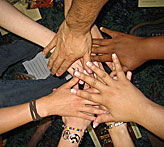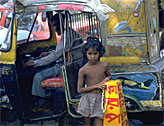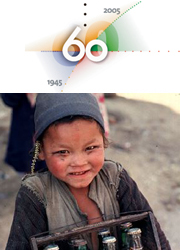UNESCO is 60
© UNESCO/ M. Ravassard
Week 45: 17/07-23/07 2006Sporting events are hugely popular in our society, and athletes serve as role models for our children. Sport and physical education can play a large role in educating young people. More © Christian Roux
Week 44: 10/07-16/07 2006Cloning, genetically modified food and nanotechnologies can be used for the benefit of humankind, but at the same time they raise ethical questions. More © Dain Hubley
Week 42: 26/06-02/07 2006Doping runs counter to the ethics of sport. It is also a serious threat for athletes’ health. In 2005, UNESCO adopted an International Convention Against Doping in Sport.
© UNESCO/Roger, Dominique
Week 35: 08/05-14/05 2006Imagining the future and serving as a laboratory of ideas: these are among the goals of UNESCO since its creation. More  ©Joey Lyons
Week 29: 27/03-02/04 2006Violent incidents related to racism are on the rise. UNESCO fights racism in all its forms by promoting education on human rights and implementing standard-setting instruments that celebrate diversity. More  ©UNESCO/S.Castro
Week 18: 09/01-15/01 2006Given the rapid social changes provoked by globalization and technological innovation, UNESCO’s initiative for the Management of Social Transformations (MOST) provides a crucial bridge between social sciences and today’s political decision makers. More  © Sebastião Salgado
Week 14: 05/12-11/12 2005The fight against religious intolerance, racism, gender discrimination: since its inception, UNESCO has endeavoured to eradicate discrimination of all kinds. More  © UNAIDS/Liba Taylor
Week 7: 17/10-23/10 2005Between 1990 and 2004 poverty caused over 270 million deaths worldwide, four times more than both World Wars combined. More  © UNESCO/A. Hossain
Week 2: 12/09-18/09 2005Poverty, pollution, terrorism –the threats to human security are increasing. UNESCO has remained faithful to its ideals of peace and security by reinforcing its actions in these areas over the past ten years. More |



